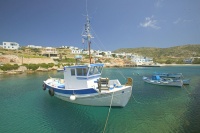Fisheries in the Cyclades islands: the present and the future

Fisheries in the Cyclades islands: the present and the future
Paros Island, 30 March 2013
Commissioner Maria Damanaki gave a speech at the two-day conference 'Fisheries in the Cyclades islands: the present and the future', organized by the Major of Paros and the cultural association "Arhilochos".

I would like to express my sincere thanks to both the Major of Paros and the cultural association "Arhilochos" for organizing this event and for inviting me. With so many parties represented here, this is a perfect opportunity to engage in a productive dialogue and define apt solutions to the problems that our beautiful archipelago is facing.
And problems there are. Let's face it: there are less and less fish, much less than what I remember from my youth, and we must all do something about it. Fish is important not just for biodiversity: it is important for our economy.
It is precisely to tackle these two aspects that I have embarked on a deep reform of the Union's fisheries policy – reform that is now well underway. But bear in mind that in the case of the Cyclades we are governed by the Mediterranean Regulation, and this is a modern Regulation that already takes the main components of the ecosystem into account. It will not be touched by the reform.
So there are no excuses for Greece not to adhere to its provisions in full. So far only one management plan for small pelagic stocks has been adopted, out of the three that are compulsory. Posidonia meadows have not yet been mapped - whereas we are supposed to enforce concrete fishing restrictions in sensitive habitats.
The Cyclades still know the practice of dynamite fishing, which is illegal and which we are supposed to eradicate. Illegal gear is still in use and big vessels still encroach on areas reserved to small boats.
And yet, as I always say, the Southern Aegean would be a perfect place to set up Marine or Fishing Protected Areas, which preserve biodiversity and at the same time bring in new forms of tourism, such as eco-tourism.
We should even be thinking of a network of protected areas, the centre of which could be here.
But none of this is possible without your direct engagement, without a real effort at local level. This is where you come in. I strongly encourage the Cycladic community to make the effort and make concrete proposals to the central authorities on possible locations for protected areas. I assure you it will be worth it. The Commission will strongly support such initiatives, which will be eligible for funding starting next year.
Speaking of funding, Greece is also late with the implementation of its Operational Programme. To date, only the permanent cessation of fishing vessels has reached a satisfactory level.
But incentives can be provided to use more selective gear and new technology, particularly for small–scale fishing; to create marine protected areas; and to help the protection and growth of aquatic fauna and flora. On the latter, initiatives have already been successful in Dodekanissa and on the island of Kalymnos, and should inspire similar projects in this archipelago.
Local development plans are a bit more advanced: the Developmental Corporate of Cyclades has taken the first steps to implement them, but it will now have to fast-track the project selection and submission for funding, otherwise those plans might never happen.
I realize that there are administrative gaps that need to be bridged. I also realize that we are new and inexperienced in this kind of bottom-up approach. But it is going to be the future, ladies and gentlemen. Better get used to it. Personally I suggest we start practicing in this last year of implementation of the Fisheries Fund.
Let us pick up the pace and tackle the problems now, because it will be one of the main components of the future funding system and we need to be ready.
And let us talk a bit about the future funding system: under the new Maritime and Fisheries Fund, the amounts Member States receive will be proportionate to the size of their fisheries sector and particularly of their small-scale fisheries. We want to help the sector implement the reform, so the money will go to the fishermen. We don't know yet the precise figures that will be allocated to each Member State, but bear in mind that the Commission's proposal acknowledges the unique situation of remote islands and therefore stipulates a higher share for them. This means that in practice a beneficiary who undertakes a project here in the Cyclades will have to pay only 15% of the costs out of their own pocket.
Ladies and gentlemen,
I am sure you share my concern: our interest in the sustainability of the fisheries in the Cyclades islands is twofold: on one hand, fishing activities here support the local economy; on the other, the fishing areas require protection and proper management. Balancing these interests is far from easy, but it is the responsibility of all levels of governance.
In Brussels the reform process is moving ahead. The European Parliament and the Council have expressed support for the key principles put forward by the Commission. They agree that we only should fish at sustainable levels; that we should gradually stop discarding; that it doesn’t make sense to micro-manage every detail from Brussels. They too want a policy that is more adaptive, more region-specific, and which will give local stakeholders a more active role to play in the management of their fisheries.
In Cyclades you are the local stakeholders. Get ready to take up that active role. Help us shape a more respectful way of fishing and a smarter way to do business, one that makes our beautiful waters stay alive for ever.


